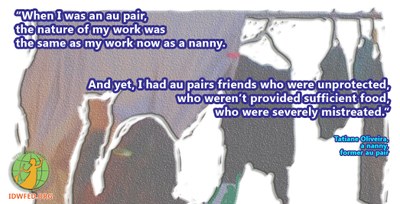
Matahari Women Workers’ Center Au Pair Organizing Committee
In November 2019, Philadelphia enacted a Domestic Workers’ Bill of Rights, joining one other city, Seattle, and nine states: Oregon, California, Connecticut, Illinois, New York, Massachusetts, Hawaii, and Nevada. Massachusetts passed its Domestic Workers’ Bill of Rights in 2014. In December 2019, the United States Court of Appeals for the First Circuit, in Massachusetts, ruled that au pairs are covered by Massachusetts’ Domestic Workers Bill of Rights. Once again, domestic workers organized, persisted, organized some more, cut through the fog and smoke of “like one of the family” and “care work is loving work and therefore not work at all”, and secured victory. While this ruling “only” applies to Massachusetts, Maine, New Hampshire, Rhode Island and Puerto Rico, its implications are both national and global, and it is a major victory for women workers’ rights everywhere.
The case emerged when Culture Care Au Pair, an au pair sponsorship agency, sued Massachusetts. Culture Care claimed that au pairs were not workers but rather participants in a cultural and educational exchange program. The Matahari Women Workers’ Center, which had worked for the passage of Massachusetts’ Domestic Workers Bill of Rights, immediately spun into action, organizing domestic workers, finding lawyers, and keeping the pressure on. When the Court threw out Culture Care’s arguments, Monique Tú Nguyen, Executive Director of Matahari Women Workers’ Center, said, “This is a huge win for au pairs, who provide crucial live-in child care to families across the state. They do the critical caregiving work that makes all other work possible.”
This is a huge win for au pairs and for all workers, overwhelmingly women of color, who provide critical caregiving work.
Since the First Circuit decision, instead of trying to figure out how to comply with the new circumstances, many parents have mobilized and lobbied Massachusetts state legislators to find a way to preserve the status quo, to find a way to keep their au pairs from being formally protected as workers and from being formally and existentially recognized for the work that they do. The press has largely focused on how families and agencies have been “upended” by the court ruling and how they’re “struggling” to comply. Families are “up in arms”. Where is the coverage of the impact on au pairs? The struggle for women workers’ dignity continues.
The First Circuit decision on au pairs means that au pairs must be paid the Massachusetts minimum wage, $12.75 an hour, and that au pairs must receive meal breaks, overtime, and all other benefits covered by law. 2019 was a big year, perhaps a turning point, for au pairs across the United States. It began with a $65.5 million settlement between 100,000 former au pairs and 15 companies which sponsor au pairs. That settlement came out of a class-action lawsuit filed by ten or au pairs in a Denver federal court. Those au pairs worked with Towards Justice, a Denver-based advocacy group. When the settlement was reached, David Seligman, Executive Director of Towards Justice, said, “This settlement, the hard-fought victory of our clients who fought for years on behalf of about 100,000 fellow au pairs, will be perhaps the largest settlement ever on behalf of minimum wage workers and will finally give au pairs the opportunity to seek h.”
From Denver to Boston and beyond, justice for au pairs, domestic workers, women workers is forged by the persistence of women workers who fight for years, who were never meant to survive. Matahari Women Workers’ Center understands it’s time for those who were never meant to survive: “Matahari Women Workers’ Center (“Matahari”) is … committed to building a world without economic violence and exploitation. Our community believes in the transformative power of survivors and is committed to developing the leadership of women of color, immigrants, and low-wage workers.” From domestic worker victories and advances in South Africa, Philadelphia, Denver, Massachusetts, 2019 was a year that saw the expansion and deepening of domestic workers’ rights, dignity and power everywhere. Spread the news! The struggle continues.

(Photo Credit: Matahari Women Workers’ Center) (Image Credit: International Domestic Workers Federation)